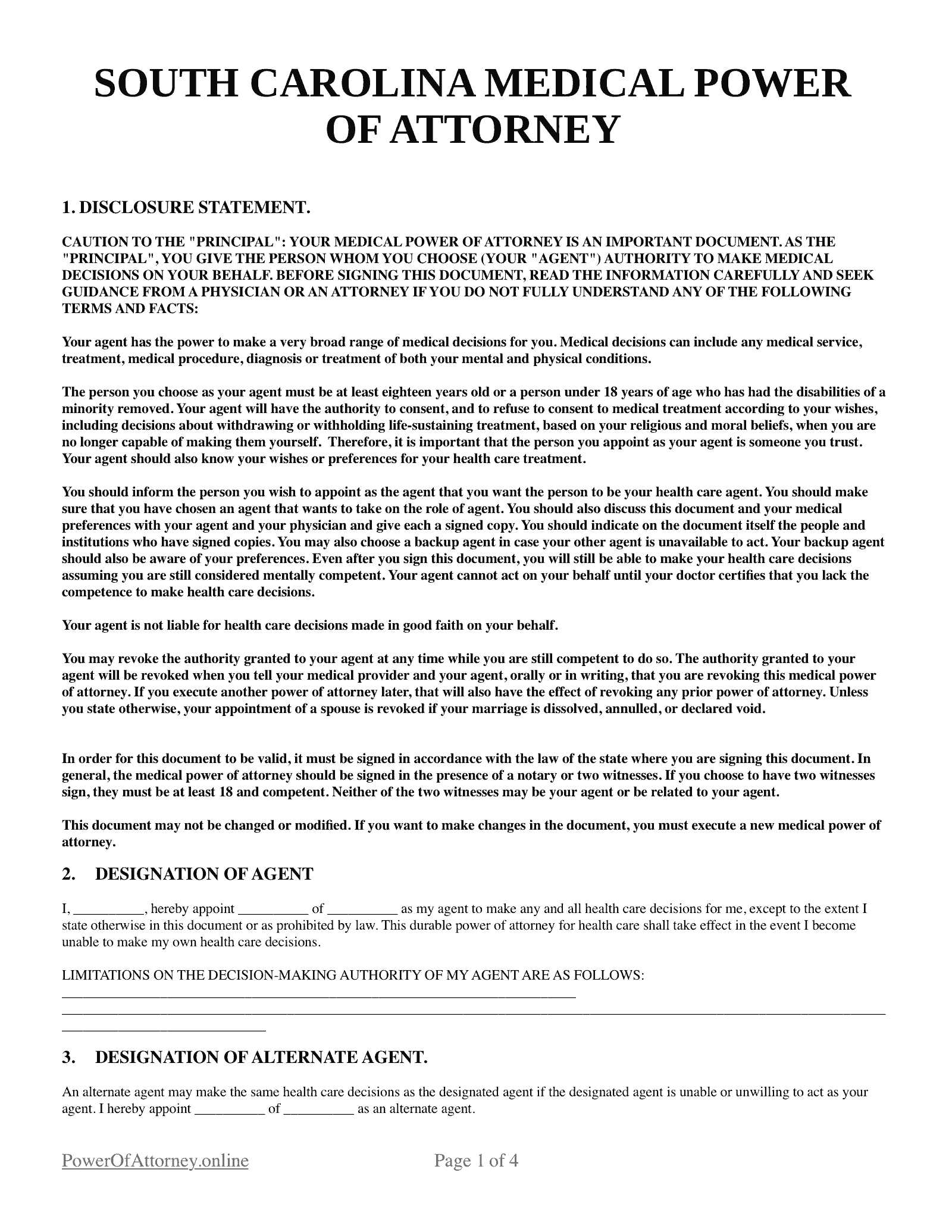Free South Carolina Medical Power of Attorney Forms
A medical power of attorney, also known as a medical or healthcare POA, is a legal form in South Carolina that grants permission for one individual (the agent) to make decisions regarding the healthcare of another (the principal).

South Carolina Medical Power of Attorney Laws
The laws governing medical power of attorney in South Carolina define the agent or “health care agent” as “an individual designated in a health care power of attorney to make health care decisions on behalf of a principal.”
The code also defines healthcare POA as a durable POA in South Carolina. This means that it remains in place even if the principal becomes incapacitated (SC Code § 62-5).
Signing Requirements in South Carolina
In South Carolina, a POA must be witnessed by both a notary public and two qualified adult witnesses for it to be legally binding. This is set out in the laws governing the legal document (SC Code § 62-5-517(4)).
How To Write a Medical POA in South Carolina
In South Carolina, you may decide to hire a lawyer to create a medical POA for you. However, if you decide to create one yourself or use a free printable template, there are a few steps you should take. These are as follows.
1. Choose an agent
This person acts on the principal’s behalf should they be deemed mentally incompetent or become incapacitated. This means the agent should be someone trusted by the principal who is willing to take on the role.
As the role grants permission of the authority over a range of healthcare decisions, the agent could also be someone who has a healthcare or medical background, if this is feasible.
2. Add personal information
A medical POA form needs to have the full legal name and addresses of both the principal and the agent. It should also include contact information for the agent.
3. Make the declaration
Due to the nature of a medical POA, the principal will need to sign a declaration confirming that they are of legal age and of sound mind to grant permission to their agent. This ensures that the principal is not being taken advantage of or forced to sign a medical POA.
4. Define preferences
A medical POA covers various matters relating to health, including the principal’s preferences on end-of-life care, life-sustaining treatments, organ donation, and more. It should detail the kind of medical treatment they will accept and those they won’t so that the agent has a clear idea of what the principal wishes.
The agent's role is to ensure that these preferences are met, so being as clear as possible is always best.
5. Set duration and revocation terms
While a healthcare POA is considered durable under South Carolina law, there still should be revocation terms and processes set out in the POA. This means defining a point at which the agent ceases their authority. It could be in the event of full and total recovery, which would allow the principal to make their own healthcare decisions once more.
6. Choose alternate agents
A medical POA may be set to come into effect when the principal’s health has declined to a certain point. This means that the agent may not be required for some time. In some instances, an agent may not be able to fulfill their role, so having alternate agents available is helpful.
Include at least two other alternate agents in your POA, along with their contact information.
7. Add the principal’s signature
Before a medical POA is legally binding, it must be signed by the principal.
8. Choose witnesses and a notary
In South Carolina, a medical POA must be witnessed by two qualified adults and notarized for it to be valid.
9. Set an effective date
In your POA, you will need to include a date on which the medical POA becomes effective to ensure that all parties are clear.